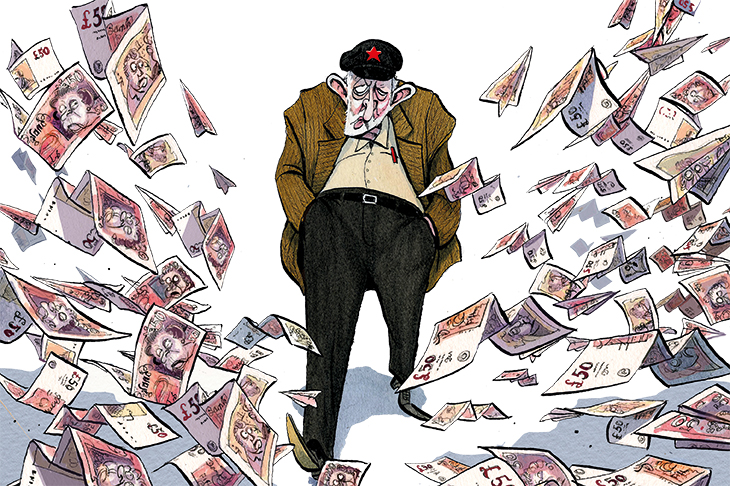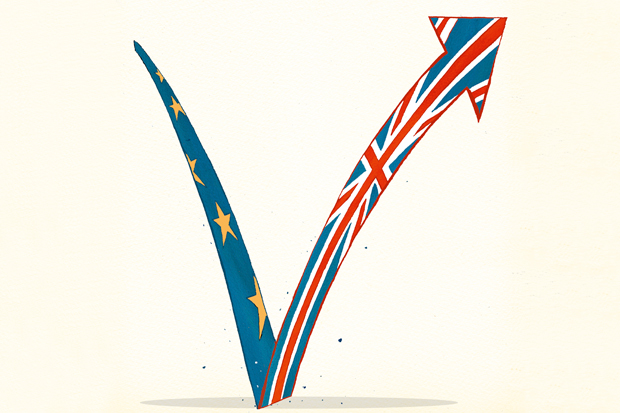What’s wrong with UK financial markets? The global economy is recovering, but British stocks and shares are not keeping pace. The pound has failed to recover from the slide it experienced in the wake of the EU referendum. This is frequently blamed on investors being spooked by Brexit, even more so by the possibility of a no deal. But has anyone actually asked the markets what is spooking them? Look closer and it becomes clear that while Brexit is a problem for some investors, most are much more worried about a far bigger risk, even if they rarely speak about it in public. It is the possibility of a Corbyn government.
Since last year’s election, when the Labour leader came within a stone’s throw of No. 10, it has been impossible to write off the idea of a Corbyn victory. And we’re about to enter a time when anything can happen. Theresa May looks doomed to lose the Commons vote on her Brexit deal on 11 December; the DUP has said it may well withdraw its support from the Tories, leaving the Prime Minister without a majority. Whatever the Commons result, turmoil is more or less guaranteed — and one possible outcome is a general election as early as January.
A no-deal Brexit would unquestionably cause short-term ructions in the UK economy, as well as affect the pound and the FTSE — for what economic forecasts are worth (which is not very much, to judge by recent history). Oxford Economics recently claimed that GDP would be 2 per cent smaller than expected, pushing the UK into a mild recession. But even if that were to happen (and it has to be remembered just how far Treasury forecasts were out when they claimed the economy would shrink by 3.6 and 6 per cent in the event of a Brexit vote), growth would then rekindle, trade would continue, companies would re-route imports and exports, and an inflationary spike would die down. But if Corbyn were to be elected on a ‘radical socialist’ platform, investors can only guess as to what might happen.
Last month, wealth manager Saunderson House conducted a survey of high-net-worth clients asking them about the biggest fear for their wealth. The most common concern was a change of government, with 42 per cent reporting themselves worried. Brexit hardly featured. Among 50- to 64-year-olds, for example, only 25 per cent were worried about ‘global instability’ —which included the risk of a no deal. Among 36- to 49-year-olds, global instability hardly featured at all: they were worried firstly about losing their jobs, with a change in government running a close second.
‘There is a clear understanding of the upsides and downsides of Brexit,’ says Gareth Parsons, who conducted the survey. ‘But a Corbyn government is a much greater unknown, and so is a much bigger fear than Brexit. We have clients who are laying down a footing for a potential move abroad. They are setting up bank accounts in overseas locations, where they already have second homes. Many are keeping a defensive ballast to their portfolios, with very liquid short-dated government bonds.’
It is a theme which has been confirmed by others. Michael Maslinski, who runs his own wealth management outfit, recently reported that Corbyn is worrying his clients more than Brexit by a factor of ten. ‘Concerns about Corbyn have doubled over the past couple of weeks,’ says Iain Tait, of wealth managers London & Capital. ‘It is now, without a doubt, the first thing that clients ask us: “What can we do to protect our wealth against Corbyn?” ’ Clients, he says, are taking money out of pension schemes, and moving it abroad. ‘There is no tax advantage to that while they remain resident in Britain, but it does protect them against a possible run on the pound.’
The figures bear this out. A recent study by an investment research firm suggested that $20 billion has been taken out of UK shares over the past two years. Wealthy individuals are also protecting themselves against a possible future wealth tax by passing money down to their children at an earlier age. In that sense, Corbyn — who has made a thing about inter-generational unfairness — has already achieved his ambition of enriching one group of young people: the teenage children of the super-rich.
Some wealthy individuals are not waiting for an election. Two of Tait’s clients have already upped and gone, one to Switzerland, one to Sweden. ‘Early in my career it would have been unthinkable for anyone to move to Sweden for tax reasons,’ he says. What Sweden does offer, on the other hand, is the political and fiscal stability that was once Britain’s strongest selling point.
Trevor Abrahmsohn, whose estate agency Glentree Estates has been selling property in and around Highgate in north London since the 1970s, has seen several families sell up in recent months — all people, he says, who had seemed deeply committed to Britain. ‘I know an Argentinian family who had bought a home in Maida Vale, as well as office space, to set up a restaurant and property businesses,’ he says. ‘They have sold everything and moved back to Argentina. There was an American family who had been in Kensington for 20 years who have done the same, plus a couple of American families in Maida Vale.’
Corbyn wasn’t the only factor in their decision to leave, he says. They were also motivated by changes to the tax rules, which require non-doms to pay a flat-rate fee of £60,000 per individual to secure that tax status — a fee not recognised by US tax authorities when enacting rules on dual taxation. ‘But it was the threat of Corbyn which pushed them over the edge,’ he adds. ‘I’ve been in business for 43 years and I’ve never seen such tangible fear. There is an old adage in property that hardened investors never sell. But they are selling now. People are getting rid of whole portfolios and putting their money into very portable forms of wealth such as diamonds, valuable coins and jewellery.’
There was little in Labour’s 2017 election manifesto which would appear at first to justify such a reaction. The document proposed an income tax rate of 45 per cent on the 5 per cent of taxpayers who earn more than £80,000 and a 50 per cent tax rate on incomes over £123,000. That is nothing compared with the 83 per cent rate on earned income and 98 per cent rate on unearned income which were imposed by the Callaghan government in the late 1970s. Yet re-assuring as the manifesto sounded, it sits ill with Corbyn’s rhetoric. At a fringe event at Labour’s conference this year, he said: ‘The very richest in our society have had tax breaks, giveaways, and tax havens. I tell you what, they’re on borrowed time.’
It is the threat of a wealth tax that is scaring wealthy individuals. It is a theme to which shadow chancellor John McDonnell has returned several times. In 2012 he gave his endorsement to a proposal by University of Glasgow academic Greg Philo (sometimes mistakenly called an ‘economist’ but actually a professor in sociology) to subject wealthy individuals to a one-off wealth tax of 20 per cent in the hope of using it to pay off the government’s debts.
‘The wealthiest 10 per cent own £4,000 billion,’ said McDonnell. ‘If you took 20 per cent of that you would then have £800 billion and we could tackle our deficit — we could tackle our debt — four-fifths of our debt would then be wiped out. So we’re saying just collect the money and make those who created the crisis pay for the crisis and that way you overcome it.’
The idea that wealthy individuals are as a group responsible for the 2008/09 crisis is absurd — what role, he might like to explain, did the Rolling Stones play in the crash? — as is the suggestion that such a tax would pay off the government’s debts: how McDonnell would manage to capture his £800 billion when, of course, highly mobile wealthy individuals have the option of fleeing the country. There is little appetite around the world for international socialist revolution, the only thing which could stop capital flight in its tracks.
On the contrary, many governments are going in the opposite direction and making every effort to attract wealthy residents. Donald Trump’s tax cuts have set out a big welcome mat for the world’s rich (if not so much for those of liberal opinion). Israel has introduced a ten-year tax holiday on the global wealth of new residents — they will pay tax only on money they bring into the country. Emmanuel Macron has reversed François Hollande’s war on the rich and offered special inducements to attract wealthy residents. Monaco recently held a presentation in London in an effort to attract wealthy individuals. Argentina and Greece, countries from which the wealthy were fleeing in recent times, are now much more settled.
Corbyn and McDonnell are unlikely to lose much sleep over a few ultra-high-net-worth individuals packing up and leaving (they might well even consider it a success), and where non-doms are involved there is not a huge loss in tax revenues if they leave. The idea of investment fleeing the country ought to worry them more. Paradoxically, some in the City believe a Corbyn government would initially boost economic growth via an increase in infrastructure investment.
The trouble is that a bounce would come at a huge cost. Many of Corbyn’s spending pledges in his 2017 manifesto were based on the assumption that if you double the rate of corporation tax you will double the revenue. That is demonstrably false — George Osborne proved it in reverse by cutting corporation tax and increasing tax receipts as a result. If corporation tax were to be jacked up there would be a very rapid fall in revenues as corporations sought to shift profits to lower-tax countries — something which McDonnell would struggle to assuage, in the absence of international socialist revolution. There could be an exodus of corporate HQs, with McDonnell unable to finance public spending increases through any means other than a sharp upward lift in borrowing, with negative consequences for markets.
‘If Jeremy Corbyn’s Labour took power, it would probably look a lot like a hard Brexit,’ says Will McIntosh-Whyte, who manages funds for Rathbones. ‘Domestic stocks would get hit hard and sterling would fall. Mr Corbyn fundamentally disagrees with many economic and legal conventions that have been sacrosanct for a generation or more. The uncertainty he brings is highly likely to unsettle businesses and investors, leading to capital flight and a rise in gilt yields.’
We would be back, in other words, in traditional Labour territory, with small–duration economic boom snuffed out via inflation and budgetary crisis. For the moment, all eyes are on Westminster — on Brexit, the mechanics of Commons majorities and the meaning of obscure passages in EU withdrawal documents. But behind the scenes serious preparations are going on for what could turn out to be a far bigger drama: Corbyn and McDonnell in power.
Got something to add? Join the discussion and comment below.
Get 10 issues for just $10
Subscribe to The Spectator Australia today for the next 10 magazine issues, plus full online access, for just $10.
You might disagree with half of it, but you’ll enjoy reading all of it. Try your first month for free, then just $2 a week for the remainder of your first year.















Comments
Don't miss out
Join the conversation with other Spectator Australia readers. Subscribe to leave a comment.
SUBSCRIBEAlready a subscriber? Log in